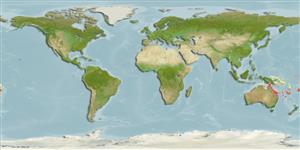>
Blenniiformes (Blennies) >
Tripterygiidae (Triplefin blennies) > Tripterygiinae
Etymology: Norfolkia: Named for the Norfolk Island ( In 1953 Henry W. Fowler named this new genus on a Collection of Fishes Made by Dr. Marshall Laird at Norfolk Island) (R.Bajol, pers.comm. 04/2016)..
More on authors: McCulloch & Waite.
Environment: milieu / climate zone / depth range / distribution range
Οικολογία
Θαλασσινό(ά) Υφαλόφιλο(α); εύρος βάθους 0 - 12 m (Ref. 13227). Subtropical
Southwest Pacific: Australia, including Lord Howe Island, Norfolk Island, Middleton Reef, and Elizabeth Reef; and New Caledonia.
Μέγεθος / Βάρος / Age
Maturity: Lm ? range ? - ? cm
Max length : 6.6 cm SL αρσενικό/απροσδιόριστο; (Ref. 54980)
Ραχιαίες άκανθες (συνολικά): 18 - 19; Μαλακές ραχιαίες ακτίνες (συνολικά): 10-11; Εδρικές άκανθες 2; Μαλακές εδρικές ακτίνες: 20 - 21. Head to eye and preopercle with scales; small and palmate supraorbital tentacle; light gray or light brown body with 2 linear series of uneven brown blotches with larger dorsal series and some upper blotches joining with lower; below eye is an oblique, dark brown bar with white margin; remainder of head dark brown, blending to white ventrally; females with oblique dark bands on second and third dorsal fins, darkening as they cross rays; uneven, vertical dark bars on caudal fin; yellow or orange dorsal and caudal fins in males. Dorsal rays IV + XIV-XV (typically XV) + 10-11 (typically 11); lateral line discontinuous, 21-24 + 14-19; mandibular pores 5-6 + 1 + 5-6 (Ref. 54980).
Adults are found in intertidal pools in coral reef areas (Ref. 13227). Eggs are hemispherical and covered with numerous sticky threads that anchor them in the algae on the nesting sites (Ref. 240). Larvae are planktonic which occur primarily in shallow, nearshore waters (Ref. 94114).
Life cycle and mating behavior
Γεννητική Ωρίμανση | Αναπαραγωγή | Γεννοβολία | Αβγά | Γονιμότητα | Προνύμφες
Fricke, R., 1994. Tripterygiid fishes of Australia, New Zealand and the southwest Pacific Ocean (Teleostei). Theses Zool. 24:1-585. (Ref. 13227)
IUCN Red List Status (Ref. 130435)
Threat to humans
Harmless
Human uses
αλιεία: χωρίς ενδιαφέρον
Περισσότερες πληροφορίες
Κοινά ονόματαΣυνώνυμαΜεταβολισμόςΘηρευτέςΟικοτοξικολογίαΑναπαραγωγήΓεννητική ΩρίμανσηΓεννοβολίαΣυναθροίσεις γεννοβολίαςΓονιμότηταΑβγάEgg development
ΑναφορέςΥδατοκαλλιέργειεςΠροφίλ υδατοκαλλιέργειαςΣτελέχοιΓενετικήElectrophoresesΚληρονομικότηταΑσθένειεςΜεταποίησηNutrientsMass conversion
ΣυνεργάτεςΦωτογραφίεςStamps, Coins Misc.ΉχοιΣιγκουατέραΤαχύτηταΚολυμβητικός ΤύποςΕπιφάνεια βραγχίωνOtolithsΕγκέφαλοιΌραση
Εργαλεία
Special reports
Download XML
Διαδικτυακές πηγές
Estimates based on models
Preferred temperature (Ref.
123201): 23.2 - 27.9, mean 26.4 °C (based on 383 cells).
Phylogenetic diversity index (Ref.
82804): PD
50 = 0.5625 [Uniqueness, from 0.5 = low to 2.0 = high].
Bayesian length-weight: a=0.00562 (0.00258 - 0.01228), b=3.08 (2.89 - 3.27), in cm total length, based on LWR estimates for this (Sub)family-body shape (Ref.
93245).
Τροφικό Επίπεδο (Ref.
69278): 3.2 ±0.4 se; based on size and trophs of closest relatives
Ελαστικότητα (Ref.
120179): Υψηλό, ελάχιστος χρόνος για διπλασιασμό πληθυσμού < 15 μήνες (Preliminary K or Fecundity.).
Fishing Vulnerability (Ref.
59153): Low vulnerability (10 of 100).
Nutrients (Ref.
124155): Calcium = 167 [66, 399] mg/100g; Iron = 1.29 [0.60, 2.61] mg/100g; Protein = 19.1 [17.8, 20.4] %; Omega3 = 0.147 [0.060, 0.365] g/100g; Selenium = 15.4 [4.9, 42.6] μg/100g; VitaminA = 47.7 [11.0, 220.5] μg/100g; Zinc = 2 [1, 3] mg/100g (wet weight);
